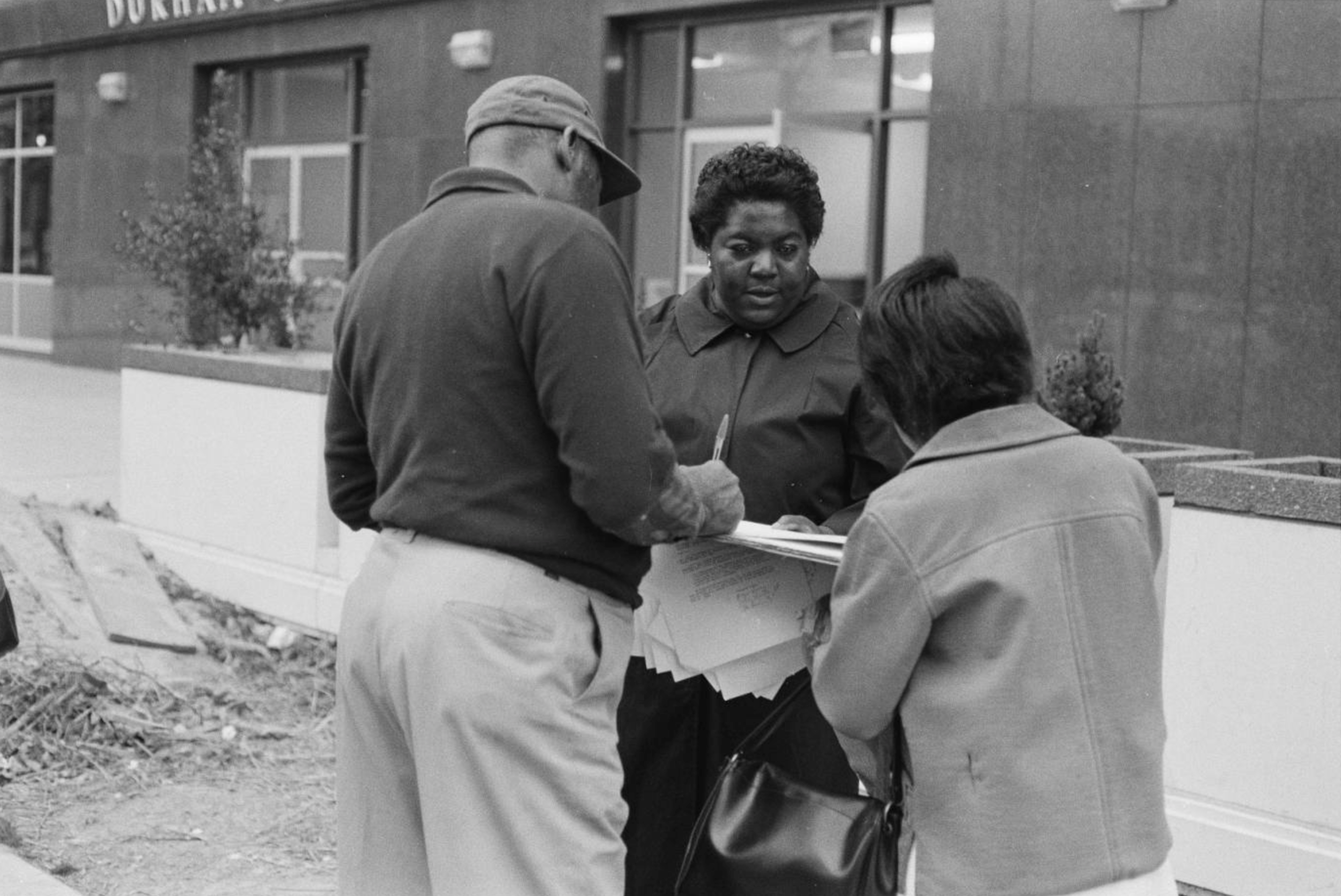Fragile Democracy
The Struggle Over Race and Voting Rights in North Carolina
“Fragile Democracy is a powerfully-told story of how the right to a living wage, quality education, decent housing, and more is directly affected by who votes. And that knowledge is at the root of epic struggles for democracy. The Fourth Circuit Court of Appeals said that North Carolina's voter suppression laws have ‘targeted African Americans with almost surgical precision.’ Leloudis and Korstad elegantly walk us through how and why.”
– Carol Anderson, Charles Howard Candler Professor of African American Studies, Emory University, author of One Person, No Vote: How Voter Suppression is Destroying Our Democracy
University of North Carolina Press
Henry A. Wallace, Progressive Party presidential campaign poster, 1948
Digital Exhibit
About the Book
America is at war with itself over the right to vote, or, more precisely, over the question of who gets to exercise that right and under what circumstances. North Carolina is a battleground for this debate, and its history can help us understand why – a century and a half after ratification of the Fifteenth Amendment – we remain a nation divided on the issue of free and fair elections.
Fragile Democracy tells the story of race and voting rights, from the end of the Civil War until the present day. It shows that struggles over the franchise have played out through cycles of emancipatory politics and conservative retrenchment. When race has been used as an instrument of exclusion from political life, the result has been a society in which vast numbers of Americans are denied the elements of meaningful freedom: a good job, a good education, good health, and a good home. This history points to the need for a bold new vision of what democracy looks like.
Antipoverty activist Ann Atwater canvassing for votes, Durham, N.C., 1967. Courtesy of the North Carolina Collection, Wilson Library, University of North Carolina at Chapel Hill, Billy Ebert Barnes Collection.
“Fragile Democracy provides a powerful reckoning with the history of voting rights, from the era of Reconstruction to our own time. James Leloudis and Robert Korstad have crafted a must-read book for anyone concerned with the past, present, and future of American democracy.”
– Kevin M. Kruse, Professor of History, Princeton University, co-author of Fault Lines: A History of the United States Since 1974
“This book is essential reading. The authors argue, and I think rightly, that white supremacist rule for almost a century did more than any other force to impoverish North Carolina and its people. Today, our democracy is still under siege. Efforts at voter suppression continue, as does the struggle to guarantee every citizen free access to the vote and the power to influence public policy.”
– Harvey Gantt, civil rights trailblazer, Charlotte’s first African American mayor, 1983
“The core issues in Fragile Democracy have become deeply politicized in a partisan manner, and the only way to cut through that noise is by providing a reader with a factual narrative. Leloudis and Korstad do just that, delivering a detailed account of the history of racial politics in North Carolina dating back to the Civil War.”
– Angie Maxwell, Director of the Diane Blair Center of Southern Politics and Society, University of Arkansas, co-author of The Long Southern Strategy: How Chasing White Voters in the South Changed American Politics
Authors
James L. Leloudis
Professor of History, Peter T. Grauer Associate Dean for Honors Carolina, and Director, The James M. Johnston Center for Undergraduate Excellence, College of Arts and Sciences, University of North Carolina at Chapel Hill
Robert R. Korstad
Professor Emeritus of History and Public Policy, Sanford School of Public Policy, Duke University
We completed our Ph.D.’s in the 1980s at the University of North Carolina at Chapel Hill, where we worked in the Southern Oral History Program – then, as it is today, a beacon for students who believe in scholarship’s power to make change in the world. We have continued along that path ever since. At Duke University, Bob helped to guide the Behind the Veil Project, which used oral history interviews to record the living memory of black communities in the age of segregation. Today, at UNC, Jim co-chairs a new Commission on History, Race, and a Way Forward. Its charge is to promote racial healing and repair by researching, documenting, and teaching the story of slavery and Jim Crow at the university. We have also worked as expert witnesses in court cases aimed at defending every citizen's right to vote. Fragile Democracy is a part of this long commitment to writing history that looks forward to a more just and equitable future.
More from the Authors
We have written extensively about the social, political, and economic history of North Carolina and the American South in the late-19th and 20th centuries. Our books examine ordinary people’s struggles to claim a full measure of American citizenship. We study the past as a source of inspiration for building a more democratic state and nation.










